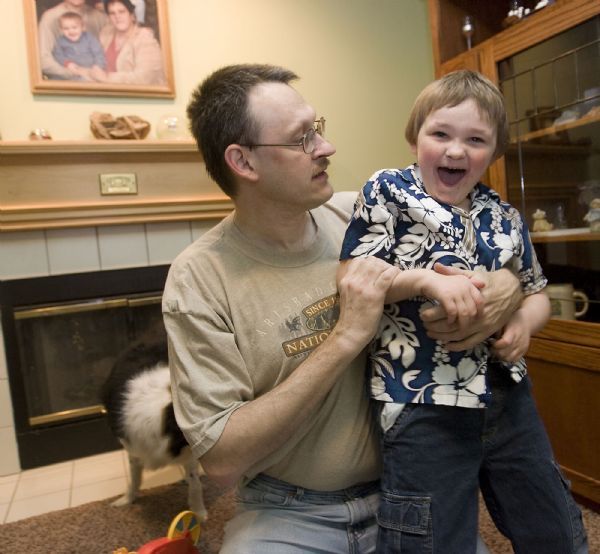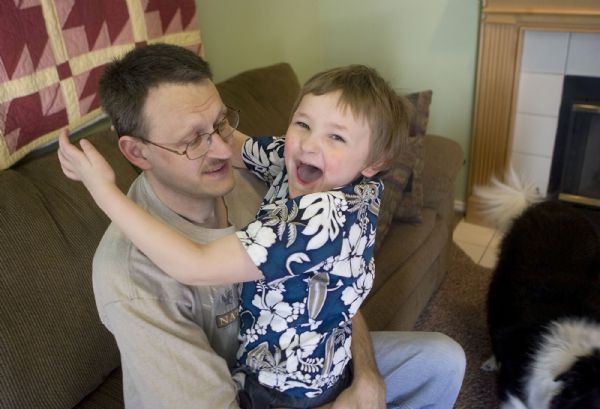This is an archived article that was published on sltrib.com in 2010, and information in the article may be outdated. It is provided only for personal research purposes and may not be reprinted.
Learning her second-born child, Aiden, had a rare, disabling genetic disorder and may never walk or talk was "devastating" for Michelle Gilbert.
There is no cure for Angelman syndrome, and Gilbert doubts one will be found in Aiden's lifetime. But that hasn't stopped the West Jordan mother of two from hoping and doing her part to advance the cause.
An advocate and staunch supporter of the National Angelman Syndrome Foundation, Gilbert has helped organize a one-mile walk to raise awareness and money for the foundation.
"It's a way for us to share our fight with others in the community, and promote greater acceptance for people with disabilities," said Gilbert. "And it's a great opportunity to see old friends."
The walk, to be held Saturday, May 15 at Veteran Memorial Park in West Jordan, will coincide with similar events in 22 metropolitan cities nationwide.
The goal is to raise $1 million for family outreach and medical research, said Eileen Braun, the foundation's executive director.
A disorder occurring in 1 in 15,000 people, Angelman syndrome (AS) wasn't identified until 1965 and is often misdiagnosed as cerebral palsy or autism. It causes a constellation of developmental problems, including mental retardation, lack of speech, seizures, inappropriate laughter and problems with balance and walking. Individuals who have it require lifelong care.
Researchers have traced the cause to the mutation of a single gene, but no one has been able to explain how the defect happens, or results in the debilitating neurological symptoms of AS.
Genetic tests are available for diagnosing the disease, said Braun. "But there is no treatment, which is why we're walking."
With rare diseases, there tend to be fewer resources available for developing treatments, which is why the sharing of information is key, explained Braun. Her foundation is building a treatment and research institute, which will serve as a hub for more than 30 AS groups worldwide, public funding arms like the National Institutes of Health and drug makers and biotech companies.
Information is also invaluable for families, said 32-year-old Ashleigh Sorenson whose 29-year-old sister wasn't diagnosed until age 10.
"She was falsely diagnosed with several conditions before doctors finally determined she was undiagnosable, a fluke of nature," said Sorenson who lives in Salt Lake and will participate in Saturday's walk. "It wasn't until we read a newspaper article about someone with Angelman syndrome that we figured it out."
Doctors today are more familiar with disease.
Gilbert's son was diagnosed at 20 months.
"We knew something was wrong, but we didn't know what," said Gilbert. "When he was a year old, he could barely sit up by himself. He couldn't crawl or walk. And his only interest was in toys."
The breaking point was one especially severe bout of pneumonia, which convinced the Gilberts to seek help from a pulmonologist.
"Our doctor spent about 10 minutes asking us questions. He immediately knew what was wrong, and blood tests confirmed it," recalls Gilbert. "We were just devastated. I didn't know what to do."
Initially, the foundation served as a place to share her grief and learn from others how to manage symptoms: abnormal sleep patterns, hyperactivity and the seizures.
Today, it helps her keep tabs on medical advances and stay in touch with friends.
Aiden, now 5, has exceeded expectations, said Gilbert. He's healthy, walking, going to kindergarten, can say a few words and sign 10 to 15 more.
"We include him on everything we do. It changes the way we do it. But we just try to live our lives," said Gilbert. "He's taught us to enjoy the little moments and to expect the unexpected. Anything's possible. If not this generation, maybe we'll solve this for the next. I think there's always that hope."
National Walk
A one-mile walk to spread awareness of Angelman syndrome and raise money for research and a national support group.
When » Saturday, May 15 at 10 a.m.
Where » Veteran Memorial Park in West Jordan, 1985 W. 7800 S.
Angelman syndrome » A rare neuro-genetic disorder that is often misdiagnosed as autism. It causes severe developmental delays and occurs in one in every 15,000 births.
How to help » For more information about participating in this year's walk or to donate to the Angelman Syndrome Foundation, go to, www.angelman.org/walk.





